|
|
|
Sort Order |
|
|
|
Items / Page
|
|
|
|
|
|
|
| Srl | Item |
| 1 |
ID:
178389


|
|
|
|
|
| Summary/Abstract |
Globalisation presents the opportunity for universities to have a world-wide presence but newer institutions in developing countries have difficulty in embarking on such a journey. This paper presents a case study of an emerging university in East Africa and explores the challenges of high ambition while responding to globalisation. Interviews with senior administrators and academics showed that much time and effort was spent responding to funding issues and aid conditions, attaining international standards in research and teaching, and managing challenges of digital technologies against a background of limited infrastructure. In response to globalisation, we argue that emerging universities of this type should consider re-directing limited resources to focus on long-term projects for growing human capital through professional development while developing basic infrastructure needs.
|
|
|
|
|
|
|
|
|
|
|
|
|
|
|
|
| 2 |
ID:
178381
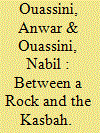

|
|
|
|
|
| Summary/Abstract |
This article explores the impact of tourism gentrification on the residents of the Kasbah in the city of Tangier, Morocco. It utilizes qualitative methods to reveal how the Kasbah has become a site of contention between the Moroccan neoliberal state, the foreign investors and settlers, and the residents of Tangier as they negotiate place and identity. The paper will examine how the process of tourism gentrification is not only reinforcing a demographic shift in the Kasbah by displacing the locals but also how the foreign urban settlers are increasingly becoming the filter through which traditional Moroccan culture is conspicuously produced and legitimized. The article will end with a discussion on the mixed contentions surrounding the gentrifying presence of the foreign urban settlers on the residents of the Kasbah and the city of Tangier.
|
|
|
|
|
|
|
|
|
|
|
|
|
|
|
|
| 3 |
ID:
178386
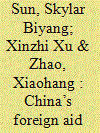

|
|
|
|
|
| Summary/Abstract |
Since the 1990s, China has formalized its short-term foreign aid training for foreign officials and technological personnel. This type of training often lasts for 21 days and participants from invited countries arrive in China for a period of condensed study, with all fees covered by the Chinese government. By the end of 2009, China had organized more than 4000 short-term training programs for over 120,000 personnel from more than 50 countries. Along with the establishment of the Twelfth Five-Year Plan and the constructional needs of the Belt and Road Initiative, China has gradually increased the export of its cultural products in foreign aid training. Surprisingly, such national-scale training is largely omitted from current scholarly research. Employing the “fragmented authoritarianism” model, we look at the administrative structure of China’s foreign aid training and provide rudimentary research into the field.
|
|
|
|
|
|
|
|
|
|
|
|
|
|
|
|
| 4 |
ID:
178379
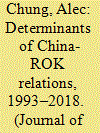

|
|
|
|
|
| Summary/Abstract |
This article seeks to explore the determinants of China-ROK relations during the period 1993–2018, employing event data and statistical analysis. The analysis found that China’s trade dependence on ROK, and vice versa, had a positive effect on China-ROK relations. The relations were also positively affected by China’s economic development. In contrast, the relations were negatively affected as China’s population aged and while conservative administrations governed ROK. The empirical findings of this article provide essential insights, identifying the factors that promote or hinder the development of cooperative China-ROK relations, suggesting guidelines to policymakers on both sides.
|
|
|
|
|
|
|
|
|
|
|
|
|
|
|
|
| 5 |
ID:
178384
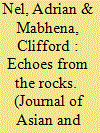

|
|
|
|
|
| Summary/Abstract |
This article seeks to characterise and contextualise land reform, and the experiences of resettled farmers, in the under-researched Matabeleland South. It does so through a historicised, landscape approach to changes in the post-Fast Track Land Reform Programme agrarian structure in two wards in Matobo District. While new land dispensation is still consolidating, outcomes are varied, and while beneficiaries are vulnerable to drought in mixed farming there is also notable resilience. Importantly, we argue that changes in the landscape ‘echo’ the past, where material and discursive changes play out at the same time as agrarian livelihoods evolve.
|
|
|
|
|
|
|
|
|
|
|
|
|
|
|
|
| 6 |
ID:
178382
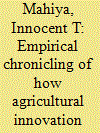

|
|
|
|
|
| Summary/Abstract |
This paper focuses on the establishment of agricultural innovation platforms (AIPs) in the communal areas of Hwedza in Zimbabwe. Through the efforts of non-governmental organisations (NGOs), there have been initiatives to improve agricultural productivity in Africa and Zimbabwe in particular. One such intervention has been the AIPs that seek to bring together all stakeholders who can meaningfully contribute to the improvement of agriculture. Using largely qualitative approaches, data was collected through interviews from small scale farmers as well as different actors who were involved in the AIPs. The respondents in the study also included NGO workers, academic researchers, government workers, traditional leaders, agricultural financiers, extension workers and state-owned institutions. Using Norman Long’s interface analysis as the central theoretical framework, key findings showed that communal areas were active communities that had their own socio-economic network systems which govern how smallholder farmers operate. It also emerged that IPs are a result of a combination of the social and the formal/institutionalised structures that interacted in Hwedza. The paper concludes that IPs were established in Hwedza through a series of interactive processes among actors and these were not always smooth and successful.
|
|
|
|
|
|
|
|
|
|
|
|
|
|
|
|
| 7 |
ID:
178390
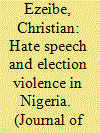

|
|
|
|
|
| Summary/Abstract |
Although research has considered how poor governance, exclusionary politics and electoral malpractice affect election violence, the effect of hate speech on election violence has not received adequate academic attention. Using a mixed methods approach with qualitative dominance, this study examines the effect of hate speech on election violence in Nigeria during the 2011, 2015 and 2019 presidential elections. The article demonstrates that an entrenched culture of hate speech is an oft-neglected major driver of election violence in Nigeria. The study concludes that the implementation of existing anti-hate speech laws presents an opportunity for protecting the rights of minority groups, promoting political inclusion and preventing election violence in Nigeria and beyond.
|
|
|
|
|
|
|
|
|
|
|
|
|
|
|
|
| 8 |
ID:
178385
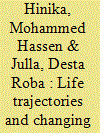

|
|
|
|
|
| Summary/Abstract |
Blacksmithing is one of the oldest traditional technologies among the rural communities of Hararge. Smithing has many functions among which its utilitarian role for agriculturalists clearly stands. This article is basically a survey and adopted historical and ethnographic methods. By collecting qualitative data through interview, focus group discussion, observation and document analysis from seven selected waradas of Hararge, the paper aims to investigate the changing patterns in the status of smiths in terms of their social position in Hararge. It concludes that although smiths were accorded a lowly social position and therefore were not yet considered as equals of the dominant agricultural Oromo in Hararge, the dynamics of social interaction over time have improved the social status of smiths. Smiths and other occupational groups like potters and tanners were treated not as equal partners but as marginalized social groups. This was partly due to the underlying socially constructed origin of the occupational groups which put them below agricultural communities in the social hierarchy and considered them as ‘alien’ and ‘remnants’ of an ancient ‘autochthonic’ population.
|
|
|
|
|
|
|
|
|
|
|
|
|
|
|
|
| 9 |
ID:
178383
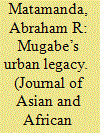

|
|
|
|
|
| Summary/Abstract |
Robert Gabriel Mugabe resigned as the President of Zimbabwe in 2017 after being in office since 1980 when Zimbabwe gained independence from British colonial rule. Mugabe implemented various policies that impacted on the urbanscape of Zimbabwe. Using a desktop approach that is based on bibliography research, the study examines Mugabe’s urban legacy through the lenses of postcolonial theory and the concept of Mugabeism. The results show that power was a dominant feature in Mugabe’s legacy, as he used it to influence the socio-spatial configuration of the urban scape whenever he saw it befitting. His power was rooted in corruption, clientism, patronage, state capture and sanctioning of opponents. Essentially, Mugabe perpetuated the colonial city, in that the postcolonial city was a replication of the socio-spatial segregation which existed during the colonial era, yet this time round it was based on class and not race.
|
|
|
|
|
|
|
|
|
|
|
|
|
|
|
|
| 10 |
ID:
178392
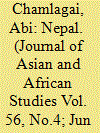

|
|
|
|
|
| Summary/Abstract |
The purpose of this article is to compare Nepal’s two Tarai/Madhesh Movements using the political opportunity structure theory of social movements. Tarai/Madhesh Movement I launched by the Forum for Madheshi People’s Rights in 2007 became successful as Nepal became a federal state. Tarai/Madhesh Movement II launched by the United Democratic Madheshi Front of the Tarai/Madheshi parties and the Tharuhat Joint Struggle Committee of the Tharu organizations failed as political elites disagreed about the need to create two provinces in the Tarai/Madhesh. While Tarai/Madhesh Movement II confirms that a social movement is more likely to fail when political elites align against it, Tarai/Madhesh Movement II refutes the theoretical proposition. Tarai/Madhesh Movement I suggests that the sucess of a social movement is more likely despite the alignment of political elites against it if its central demand consistently sustains the support of its constituents.
|
|
|
|
|
|
|
|
|
|
|
|
|
|
|
|
| 11 |
ID:
178388


|
|
|
|
|
| Summary/Abstract |
Non-racialism is a deep-rooted ideal in the history of resistance in South Africa. It is not only the basis of the post-apartheid legal order, but also crucial to the form of capitalism. This paper reinterprets non-racialism and inequality in post-1994 South Africa by revisiting conventional understandings of the nature of the state and the rule of law. It shows that racial inequality is inscribed in the non-racial form of the state. The non-racial democratic shell correlates with the commodity form. Scholars have neglected the shift in the form of the state after 1994, partly because they focus on policy and see the state as an external structure in a racial society.
|
|
|
|
|
|
|
|
|
|
|
|
|
|
|
|
| 12 |
ID:
178380


|
|
|
|
|
| Summary/Abstract |
The Kurdistan Region of Iraq has a multi-party system which has been held up as a model for democratic pluralism in the whole region. The nature of Kurdistan’s political parties is strongly related to the position of Kurds in Iraq. From the mid-twentieth century, the dominant Kurdish political party in Iraq was the Kurdistan Democratic Party; in a later partisan split the Patriotic Union of Kurdistan was born. Moreover, in the last three decades other political parties have come into being, which have all influenced the characteristics of Iraqi Kurdistan’s political system. This paper’s main argument is that Iraqi Kurdistan shares many of the characteristics of its main political parties, including reliance on charismatic leadership, a focus on nationalism, and the lack of transparency. This paper analyzes the primary characteristics of the Kurdish political parties and their influence on the institutional functions of the political system in the Kurdistan Region.
|
|
|
|
|
|
|
|
|
|
|
|
|
|
|
|
| 13 |
ID:
178378


|
|
|
|
|
| Summary/Abstract |
This article analyses the challenges of open and expansive unionism in the era of public sector reform in Zambia. A sample of 20 former and current leaders of the Civil Servants and Allied Workers Union of Zambia was engaged in the research. The research reveals that trade unions in poor countries like Zambia are more vulnerable to the challenges of open and expansive unionism. These include inter-union conflict and lack of resources for union organising. Despite their vulnerability, these unions make strategic choices to deal with these challenges. Their strategies include networking and information gathering and sharing.
|
|
|
|
|
|
|
|
|
|
|
|
|
|
|
|
| 14 |
ID:
178391
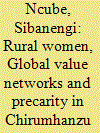

|
|
|
|
|
| Summary/Abstract |
In 1991 Zimbabwe liberalised its economy. This resulted in the opening of the national economy to foreign investment. In line with this, subcontracting arrangements between international corporations and local commodity producers became prevalent. While this attracted scholarly interest, most of it is on global agricultural value networks. By tracing the integration of rural women knitters into international markets, this article offers a different case study. While integration into the knitwear global value chain afforded the women an opportunity to earn an income, their employment remained precarious. This article draws on archival data and interviews from participants to make its case.
|
|
|
|
|
|
|
|
|
|
|
|
|
|
|
|
| 15 |
ID:
178387


|
|
|
|
|
| Summary/Abstract |
The concept of homo sacer originates from ancient Roman law under which an individual who committed a certain kind of crime was excluded from society and all his/her rights as a citizen were revoked. This paper uses a few selected cases reported in the media of Botswana and South Africa to demonstrate why undocumented migrants in the two countries fit Agamben’s description of homo sacer. While migrants in general, whether documented or undocumented, are targets of violence, exploitation and discrimination in these countries, undocumented migrants are particularly vulnerable because of their ‘illegal’ status. Although violence against undocumented migrants is not formally endorsed by the state, their description as a problem or a threat to society places them in a state of exception which is virtually outside the protection of the law.
|
|
|
|
|
|
|
|
|
|
|
|
|
|
|
|
| 16 |
ID:
178393
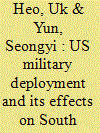

|
|
|
|
|
| Summary/Abstract |
Due to the lack of studies on the effects of US troops on an individual host state, we studied the effects of US troops on South Korea’s politics and economy. Based on security enhancement benefits, we hypothesized that USFK would have positive effects on South Korea’s investment, trade, economic growth, and political development. Employing Heo and Ye’s empirical models, we conducted statistical analyses and found that the effects of USFK on South Korea’s trade, democracy level, and economic growth are statistically insignificant and the effect of USFK on investment is negative and statistically significant. These findings need to be cross-validated with a different measure of estimating USFK’s effects because our measure, size of USFK, may not capture its effects completely although there is no other measure.
|
|
|
|
|
|
|
|
|
|
|
|
|
|
|
|
|
|
|
|
|